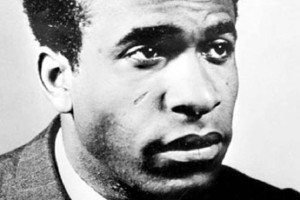Today is what would have been Frantz Fanon’s 89th birthday – born in 1925, died in 1961, but in that short time he completely changed how we think about embodiment, freedom, resistance, identity, and so much more. I’ve always been partial to Black Skin, White Masks, which I consider his greatest work. As with all ambitious work, it is flawed and is full of oversteps, oversights, and under-theorized concepts. But that’s exactly what I like about it: it thinks more than the book can contain.
For me, that is Fanon’s great legacy, to have thought more than his books can contain. Henry Louis Gates, Jr. muses famously on how Fanon’s work is like a Rorschach test, telling us more about our desires and values than the actual thing itself – this book here, these ideas and this person? No, what we say about it says something about our vision of things. I’ve always liked that essay of Gates’, but not because I think that his remarks are any sort of criticism. I think that’s an ultimate value of a work, actually, and it is an important feature, for me, of Fanon scholarship that it reveals the writers as much, sometimes more, than it reveals Fanon himself.
I think Fanon’s work has fatal flaws, which tells you about my sympathy with recent Caribbean thought that has been so thoroughly critical. I’ve written critically on his notion of affect and history (in relation to Baldwin) in Black Skin, White Masks, and also on his problematic conception of memory in The Wretched of the Earth.
A word, though, on what Fanon makes possible.
Fanon’s critique of Négritude is deep and profound, even as the terms of that criticism move so quickly in Black Skin, White Masks and the essays from the middle-1950s. Part of that critique pays off in The Wretched of the Earth when he is able (or wants) to move beyond racialized identity and toward a conception of the oppressed, the damned, or what we might now call the global South as a political and politicized identity. One divorced – and here is where I have my biggest critical hesitation – from memory and cultural politics, and therefore one capable in both numbers and collective will to contest centuries of enslavement and colonial domination.
But part of that critique of Négritude also opens up important dimensions and terms for cultural politics, even if Fanon himself didn’t take it up. That is, for me, what is so compelling about the future of Fanon is how his work pushed a conception of the new into the center of thinking. Liberation means the new, not retrieval or assimilation. How to think the new, however, is an enormous project. What that has come to mean after Fanon in the Caribbean context is a revaluation of identity and expression that attends to the space and memory of the West Indies – language mixture, racial mixture, cultural mixture, Chaos, and the identities that emerge from all of that. In other words, in just a word: creolization.
Fanon’s dismissal of creole and vernacular forms of language and culture are hard, decisive, and, frankly, naive. That’s the overstep. On the occasion of his birthday, however, it is worth recalling how much his conception of the new calls for the very thing he dismisses: an assessment of creole and vernacular forms in the frame of an unprecedented aesthetic. An aesthetic that starts with what Glissant, Gilroy, Brathwaite, Benítez-Rojo, and others call the ship, the boat, routes as roots, and other such motifs of dynamic chaos. Fanon doesn’t have that reflection in his work and, to be honest, his work cannot accommodate it. Yet, we have to also acknowledge that his early critique of Négritude is precisely what makes this new frame, this new aesthetic, and therefore this new appreciation of what is made new and new again in the Caribbean possible. The repudiation of the backward glance and embrace of the unprecedented – deferred in principle and as a matter of the materiality of history – opens up everything
It opens up Fanon’s vision of the global South and a revolutionary identity birthed from violent resistance and armed struggle.
It also opens up that reframing of the history and memory already in Caribbean space, already birthed from centuries of resistance and pleasure, something that cannot be seen without the shift from nostalgia for the old toward a dangerous embrace, even massive cultural bet, on the new as unprecedented and unanticipated.
In that new, Fanon imagined that anything is possible. Sometimes imagining possibility is plenty revolution. And the most fertile ground for another kind of future.


